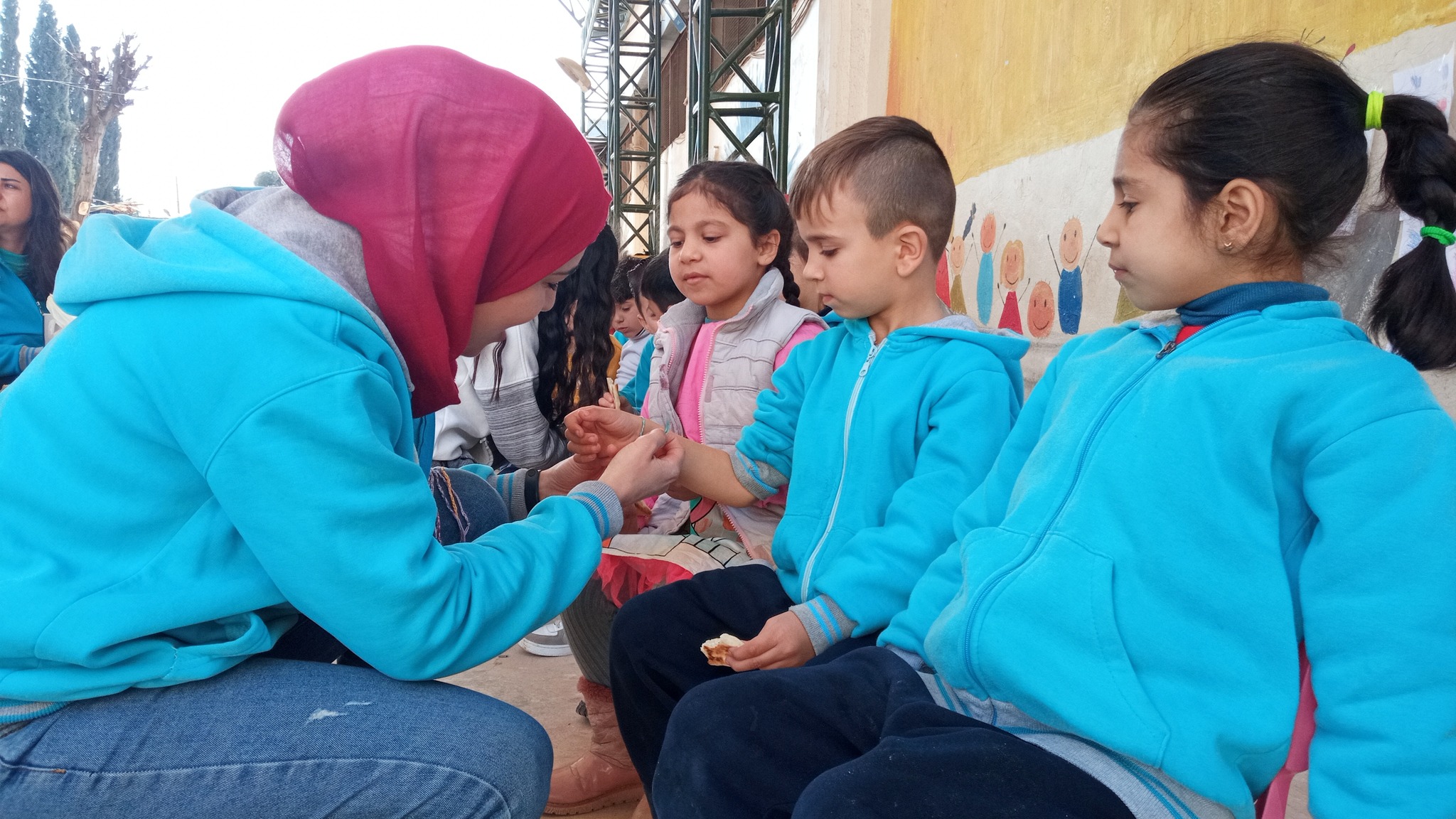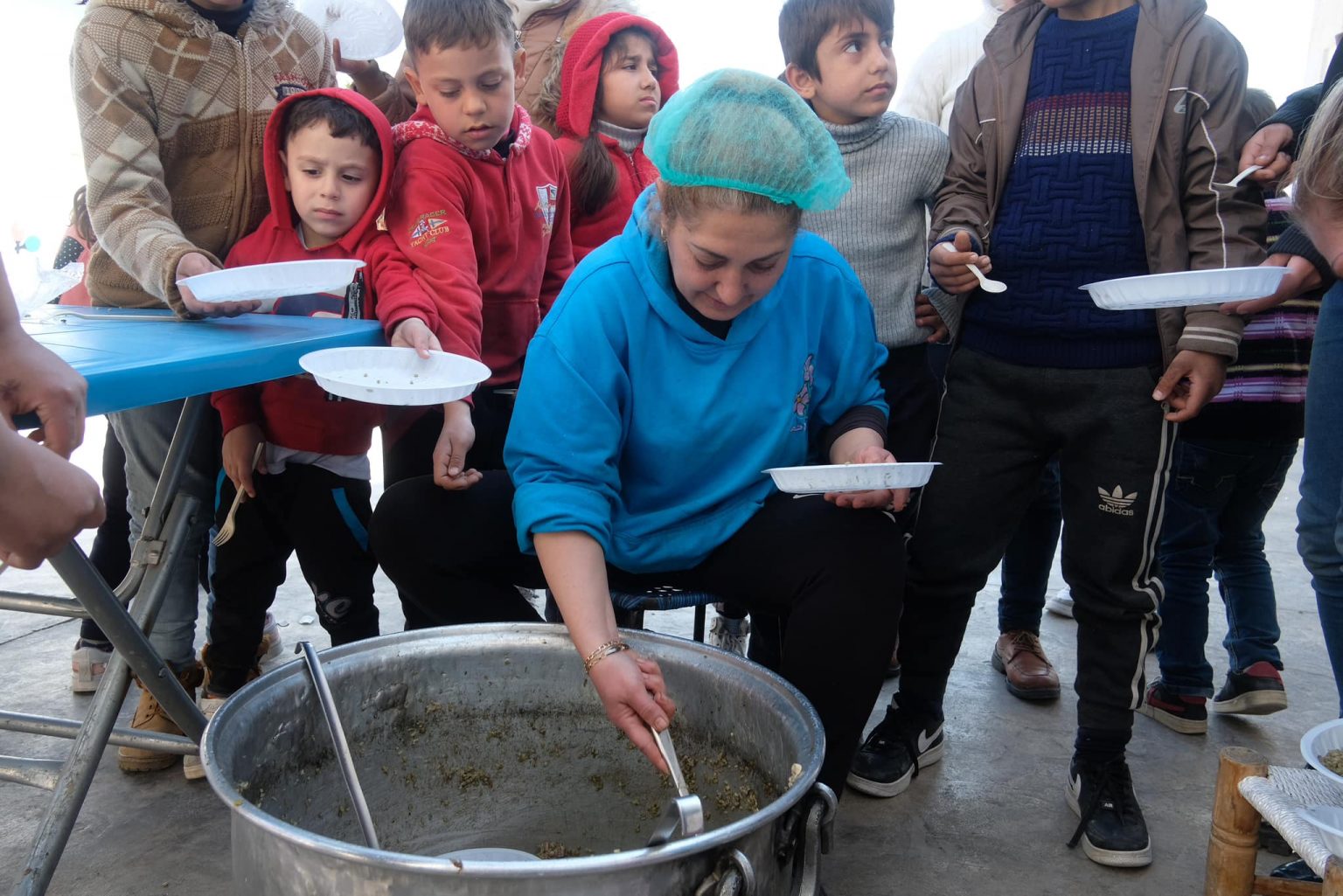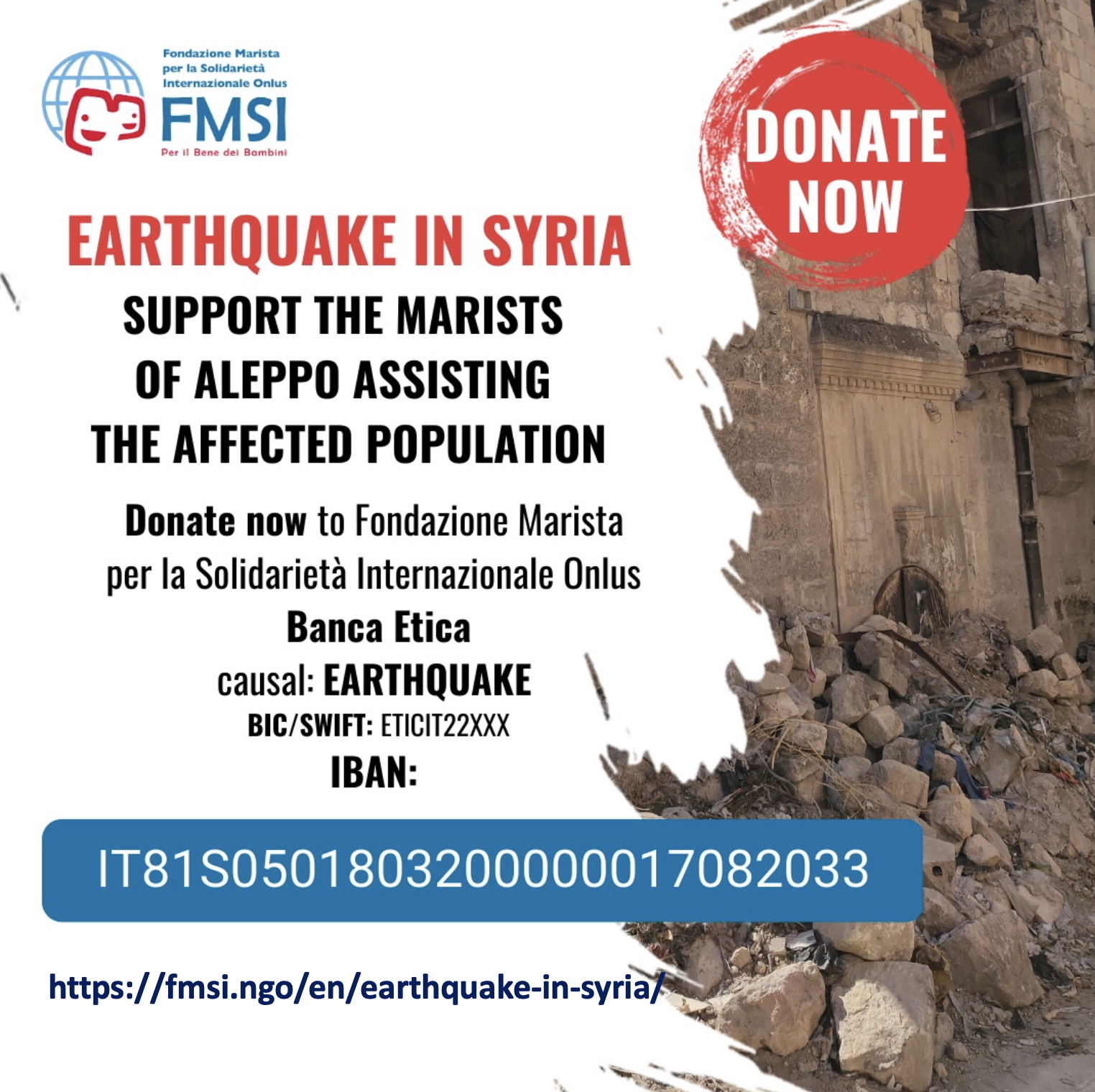
Letter From Aleppo No 46: Zelzal, another misfortune in the Syrian tragedy
Maristes Alep – Facebook | Join the Institute’s fund-raising appeal
Aleppo letter nº 46 – Zelzal: further misery in the tragedy that is Syria
Forty-five seconds were enough to force the entire population of Aleppo onto the streets.
It was 4.17 a.m. on Monday 6 February 2023; it was night; it was raining; it was cold, 2 degrees Celsius.
AND THE EARTH SHOOK. Buildings collapsed, others swayed, especially the upper floors; furniture danced around; knick-knacks and pictures fell to the floor; windows shattered; walls cracked; stones or chunks of cement or plaster fell from walls or ceilings, injuring the residents; bottles of oil, syrup, and detergent flying out of the kitchen cupboards and spilling onto the floor; and above all the deafening noise, a terrifying noise, the noise of doors slamming shut, of windows opening; and it went on and on, 45 seconds but it seemed like an eternity.
The sleeping people of Aleppo woke up with a start: the children were screaming, the adults were terrified, not knowing what was happening until they realised it was an earthquake (Zelzal in Arabic). It was total panic. People ran, down the stairs, pushing and shoving; some fell and broke limbs; and everyone, two million people, were out on the street in their pyjamas and some barefoot, in the rain and cold. Buildings collapsed, upper floors fell down, stones rained down from above injuring or killing people seeking refuge in the streets.
It was chaos
Those with cars attempted to flee their neighbourhoods to park in empty lots with no buildings around them; traffic jams slowed down their escape. Others tried to find safety in public parks, churches or mosques. Since then, the main avenues and the ring road have been filled with cars parked on the footpaths, with families spending the night in their cars. Thousands of families have set up tents on every empty lot and have been living there since the earthquake. Aleppo’s main sports stadiums are packed with thousands of families. Almost the entire population of Aleppo has been “on the streets” for days.
We later learned that the earthquake had a magnitude of 7.8 on the Richter scale, with its epicentre in a town in southern Türkiye, about 100 km north of Aleppo.

Blue Marists
Less than half an hour after the earthquake, we, the Blue Marists, opened the doors of our residence to welcome those who wanted to take refuge in our house; we had launched appeals on various social networks and responded to dozens of phone calls to say “you are welcome in our house”. Within a few hours, more than a thousand people arrived, of all denominations, frozen by the cold, drenched by the rain, shivering with fear, screaming, crying. Quickly, those of our volunteers who had come distributed hot drinks and the few blankets and mattresses we had. We had to console, soothe, calm, reassure and listen, and keep people warm in all the rooms of the residence, even in the kitchen. Fortunately, the two courtyards of the school were covered; those who had no room inside sheltered there on chairs while waiting for dawn. In the morning, we had to feed everyone, cook for a thousand people, give milk to the children, provide blankets and mattresses for everyone, and make room for everyone for the next night.
No sooner had the population calmed down than a second 7.7 magnitude earthquake struck at 13:24. Aleppo had not experienced such an earthquake since 1822.
In the following weeks, small tremors occurred every day, spreading fear among the population, until a third tremor of magnitude 6.3 occurred on Monday 20 February at 20:04.
In Aleppo alone the death toll stands at 458, the injured at over 1,000; 60 buildings collapsed or were completely destroyed; there are hundreds of irreparable buildings to be demolished; thousands of severely damaged buildings uninhabitable in their current state; and hundreds of thousands of people no longer living in their homes. Even if the buildings are intact from the outside, many are not habitable because the foundations or staircases or load-bearing walls are damaged.
Besides Aleppo, other Syrian cities were affected, in particular Latakia, Hama and Jablé; in this latter city, sixteen buildings of a single complex collapsed and 15 doctors and 16 pharmacists were killed.
For more than 20 days, our residence welcomed hundreds of people whose numbers fluctuated according to departures and arrivals. Our daily tasks were to welcome, receive, feed, dress (people had only the clothes they were wearing), process, offer the possibility of a hot bath with new clothes and underwear, comfort, look after the children, and organise the sleeping areas.
Many families stayed with us because they were afraid to go home expecting a fourth earthquake; others had their houses badly damaged or their buildings completely destroyed. So we set up a committee of blue Marist engineers to go and inspect the flats of the displaced people. If the condition of the flat is deemed satisfactory, we reassure the people encouraging them to return home. If their accommodation is uninhabitable, we rent them a flat for a year while the necessary repairs and renovations are carried out. Other associations and churches have done the same.
For four weeks, we suspended our usual projects to alleviate the suffering and help the displaced. But for the past week we have been slowly resuming our activities despite the physical and emotional exhaustion of our volunteers and beneficiaries.
Apart from the high human and material cost, the psychological trauma among all age groups is very high. Now, 35 days after the earthquake, adults and children are still in shock, anxious, desperate, having nightmares and thinking that the worst is yet to come.
Solidarity
The Red Crescent and a large number of charities and associations have mobilised, as we have, to help the hundreds of thousands of displaced people in reception centres – a mobilisation the likes of which we have never seen before.
The solidarity and generosity of other Syrian cities towards us and our neighbours in Lebanon and Iraq has been exemplary.
Syrians in the diaspora, as well, have, from day one, been collecting money and materials and undertaking initiatives to send us funds.
Our Western friends did the same with great generosity. Not to mention the very important role of many international charities and solidarity associations, especially Christian ones, which have done their utmost to meet our essential needs.
Friendly countries have sent aid and medical or debris removal teams. Around 100 planes landed at Aleppo airport from Morocco, Tunisia, Algeria, Jordan, Egypt, Venezuela and even Bangladesh, to name but a few. On top of everything else, Aleppo airport, where the planes bringing aid landed, was recently bombed by our neighbours to the south, making it unusable!
While hundreds of Western planes flew relief supplies to Turkey, only one European plane landed in Syria. How shameful! Were the rulers of the countries of human rights and “democracy” convinced that the stricken people of Syria suffered less than those of Turkey because they are living in a country under sanctions? Could they not put aside their sanctions to provide humanitarian aid to a population suffering from a natural disaster? This is outrageous to say the least. These countries have been claiming for years that humanitarian aid and medical supplies are exempt from sanctions. Firstly, this is not actually true. Secondly, if it were true, why did they ease sanctions for 180 days on humanitarian aid if it was already exempt?
Fortunately, the people in these countries have reacted differently from their governments and have shown exemplary solidarity and generosity.
These sanctions, imposed unilaterally for more than 10 years by Western countries on the Syrian people and Syria, are ineffective and unjust; they have impoverished the population, which is suffering a very serious economic crisis due to the lack of foreign investment prohibited by the sanctions.
They make us suffer by embargoing many products, resulting in shortages of fuel, petrol, bread and electricity.
They kill: most of the buildings that collapsed in the earthquake were already badly damaged by the war, but were inhabited by people who had no other choice; these buildings (and there are tens of thousands of them) could not be rebuilt because sanctions prohibit reconstruction; not to mention the dozens of people buried alive under the rubble and who died because they were not rescued in time, due to the lack of heavy machinery to remove the rubble.
Syrian population is on the edge
12 years ago today, on 15 March 2011, the events in Syria began: the Syrian population has suffered enough since then and is on the edge: years of war, sanctions and shortages, economic crisis, Covid-19, cholera and now the earthquake. So many misfortunes for a country that was once beautiful, prosperous, safe and sovereign.
Forty-five seconds were enough to force the entire population of Aleppo onto the streets; a population already on its knees after 12 years of tragedy and misfortune. But the Syrian people are a proud and dignified people, even in adversity. They ask for nothing more than to be able to lead a normal life once again in peace.
Please help us to get the sanctions lifted.
Thank you for your friendship and solidarity.
________________
Aleppo, 15 March 2023
Dr Nabil Antaki – For the Blue Marists
Join the Institute’s fund-raising appeal

